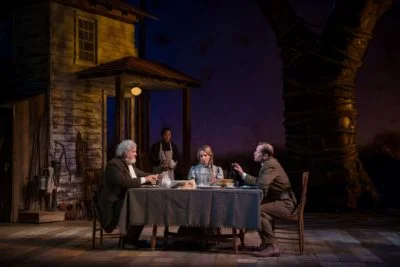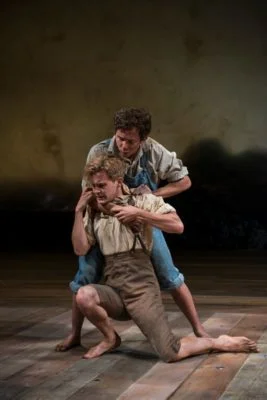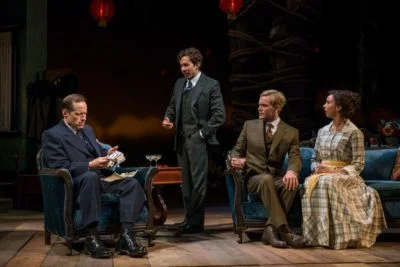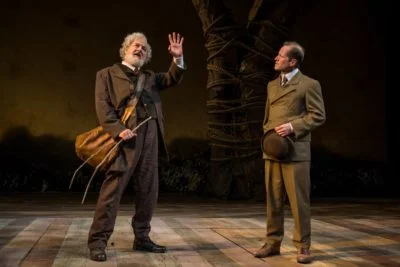East of Eden
From the Novel by John Steinbeck
Directed by Terry Kinney
Produced by Steppenwolf Theatre Company, Chicago
Steppenwolf’s fortieth season is a transitional period for the famed company. It is the final season selected by former artistic director Martha Lavey, and the first under the tenure of Anna Shapiro. In a nod to tradition, it opens with a new adaptation of John Steinbeck’s East of Eden by Frank Galati, which recalls one of the key moments in the establishment of Steppenwolf’s reputation: the adaptation of The Grapes of Wrath Galati staged in 1988, with Terry Kinney in the cast. Unabashedly mythical and melodramatic, the play is still much more tightly focused than the novel, which occasionally makes its themes a little mystifying. But in terms of acting, language, and story-telling, Steppenwolf’s East of Eden is an impressive accomplishment.

Adam Trask (Tim Hopper) is a Connecticut transplant who has recently purchased a large tract of land in California’s Salinas Valley. One of the first friends he makes there is Samuel Hamilton (Francis Guinan), who dowses the land for water. When Adam is incredulous, Samuel explains that he has the potential to sense water through mundane means, but the stick releases a psychological block that prevented him from making use of it. Adam is glad he’ll have a fertile farm, for he plans to make a home with his wife, the foundling Cathy (Kate Arrington), who turned up on his childhood doorstep with a severe head wound. Cathy is pregnant, but before giving birth, makes clear that she has no desire to remain on the farm. Samuel helps her to deliver twin boys, and she then attempts to leave the house forever. When Adam tries to forcibly prevent her, she shoots him in the shoulder.

Disappointed and confused, Adam falls into depression, until his servant Lee (Stephen Park) and Samuel rouse him by demanding that he name his sons. Concerned over the hereditary implications of Cathy’s psychosis, the men’s conversation turns to Cain and Abel. Lee muses on an oft-misunderstood line in the Bible which, he believes, properly means that Cain has the potential to overcome sin, but has to choose whether to do so. Cain and Abel are obviously inappropriate names, so Adam randomly selects other Biblical names that start with the same letters: Caleb and Aron. As the boys grow up, Adam favors Aron (Casey Thomas Brown), who physically resembles his mother, but is gentle and outwardly vulnerable. Stung by his father’s unfairness and still craving his admiration, Caleb (Aaron Himelstein) goes into business, something Adam was never very good at, and associates more frequently with grown-ups from an early age. He learns that his mother now runs a whore-house in town, which he knows would greatly disturb Aron, since they’d been taught she was dead.
Galati’s adaptation makes use of a cello and a harp (Kyra Saltman and Ben Melsky, playing music by Rob Milburn and Michael Bodeen) to provide the action with a cinematic underscore. Though the word “melodrama” has acquired a negative connotation, this production should not be stigmatized because of that; it still focuses on characters over plot or spectacle. In fact, scenic designer Walt Spangler forgoes normal Western-genre topographic grandeur in favor of a giant tree against a yellow background, and a few portable interior spaces. Tim Hopper’s Adam Trask is infuriatingly melancholy; it’s easy to sympathize with Caleb’s frustration with him. Yet it is also plain that the man only ever had good intentions for his family, and that he prizes peace and stability above all. Francis Guinan, in a supporting role, provides humor and rustic common-sense, while Stephen Park, as the nearly superhumanly patient Lee, is effectively the boys’ step-mother. The production doesn’t particularly focus on Lee’s relationship with Adam, but from the moment the babies are thrust upon him, Lee is a constant presence in the play, enduring racism with a suppressed smirk at people’s stupidity, and perceiving the Trask family’s dynamics with a clearer eye that allows him to be more helpful than they are to themselves, but also more incisive and authoritative in his rebukes.

Steinbeck’s allegory is simple, but in Galati’s adaptation, I sense a disconnect between what was intended, and what I received. Most of Adam’s backstory has been omitted; I think his brother and father were mentioned once, at most. From a plot perspective, this makes sense, but it also makes his concern over hereditary sin bizarre and uncalled for. But my greatest alienation from the characters regarded Cathy. Costume designer Mara Blumenfeld provides her with a massive scar on her forehead. In accordance with the source material, Cathy dislikes bright lights, is prone to fits of rage, and has few emotional attachments to other people. While being played by Kate Arrington, there was a noticeable pause in between when somebody would say something to Cathy and when she responded, and her words often sounded choked and slightly slurred, especially in the earlier scenes. Since there’s no omniscient narrator to say Cathy ever did anything like kill her parents prior to being beaten, she comes across more as somebody who got kicked in the head as a child than as the embodiment of inexplicable evil, which makes her more plausible as a character, but also makes everybody else’s existential agonizing over her rather silly.

But the odd disconnect surrounding Cathy’s nature didn’t ruin the story for me, and most other people don’t seem bothered by it. Actually, I enjoyed having permission to discount the allegory’s double-meaning. Samuel’s explanation for the divining rod allows us to interpret all the mythic aspects of the story as inventions by its own characters which are no less significant for being imaginary, and Lee demands to know from Caleb why he is so desperate for greatness that he role-plays being a great sinner. We’ve had several epics on Chicago stages so far this year, with a few more still to come, and epics require personal stakes. When watching Himelstein’s performance as Caleb Trask, it is clear that the struggle between good and evil is of great importance to him, and if he’s framed it strangely, his understanding of it is consistent with a large portion of society (particularly in the early twentieth century, when most people believed in some form of hereditary criminality, as a rational-sounding rebranding of original sin). Steppenwolf’s East of Eden works on enough levels, that everyone should find something in it to satisfy them.
Highly Recommended
Jacob Davis
This show has been Jeff recommended.
For more information, see East of Eden’s page on Theatre in Chicago.
Playing at Steppenwolf Theatre, 1650 N Halsted Ave, Chicago. Tickets are $20-89; to order, call 312-335-1650 or visit Steppenwolf.org. Performances are Tuesdays through Sundays at 7:30 pm and Saturdays and Sundays at 3:00 pm with select Wednesday matinees through November 15. Running time is three hours with two intermissions.

